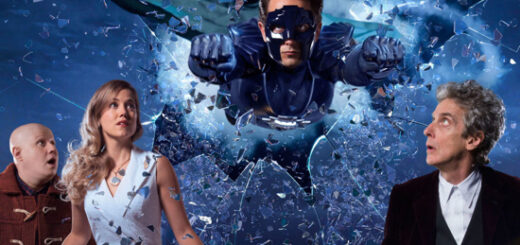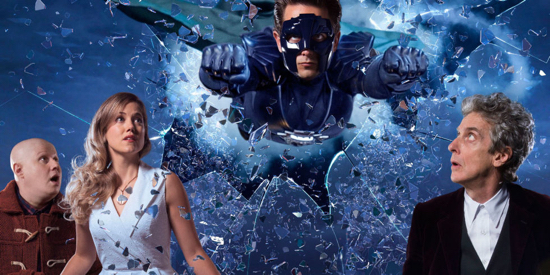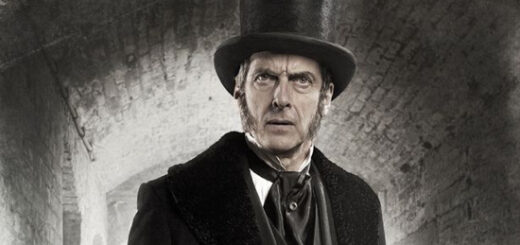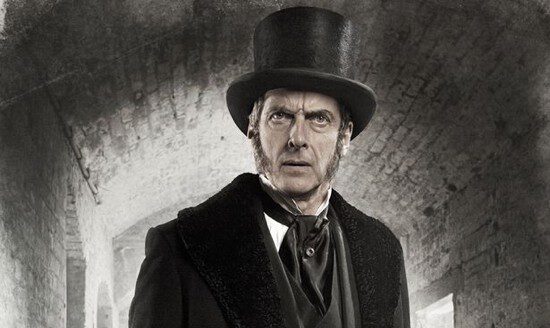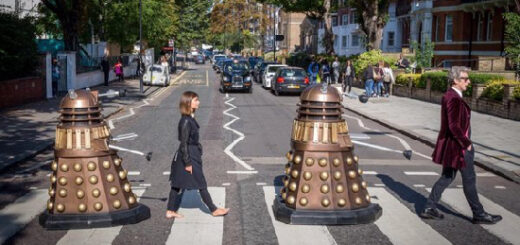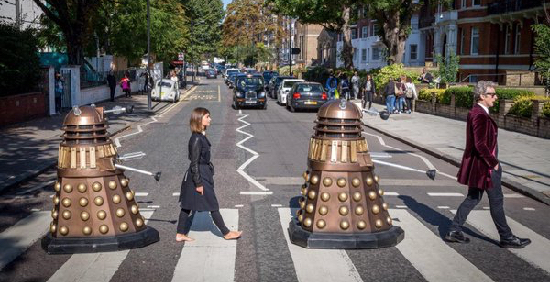John Ostrander: Happy Christmas, Doctor Who
There are all kinds of traditions connected to Christmas. One tradition in our house is the Doctor Who Christmas Special playing here on BBC America. If you don’t know, Doctor Who is the looooong running BBC series about an alien time traveler and his (usually) human companion(s) who all travel through time and space having adventures. The Doctor regenerates into a new body – and a new actor – when his current body is at its end. If you don’t know the series and/or don’t care, you can probably skip this column.
There was a sort of Christmas Special as far back as the first incarnation over a half-century ago, but mostly it’s only been over the last ten years. The latest one will be tonight (if you’re reading this on Sunday). The first in this series began after the show returned from a sixteen-year hiatus and featured the Doctor’s tenth incarnation, played by David Tennant, and his companion, Rose Tyler, played by Billie Piper, and Rose’s mother and her ex-boyfriend. The episode was also our introduction to this incarnation, the Doctor having just regenerated in the previous episode.
It’s a good, solid, interesting episode, establishing the new Doctor’s persona. The plot is about an alien invasion (the episode is called “The Christmas Invasion”) and written by showrunner Russell T. Davies; it’s sturdy enough and there are some nice Christmas touches like a Christmas tree that becomes a spinning instrument of death. The Doctor is recovering from his transformation and is in a coma for most of the show but when he finally snaps into action, it’s a treat.
By the following year, the Doctor has just parted with Rose Tyler and is feeling mopey when a woman in a wedding dress just materializes in his TARDIS. The woman is Donna Noble (Catherine Tate) and she is “The Runaway Bride.” She’s outraged, abrasive, and very rude to the Doctor who she holds responsible for her abduction. Russell T. Davies again did the scripting and this one is a hoot. I’m a big fan of Donna and was very pleased when she eventually returned as a full-time companion.
The next year brought us “Voyage of the Damned,” again written by Davies. The Doctor, temporarily without a companion, finds himself on an alien, space faring replica of the Titanic during a Christmas party. Why would aliens have a Christmas party and a replica of the Titanic? Just go with it.
There is, of course, a disaster and the Doctor must lead a group of passengers in a “Poseidon Adventure” like attempt to get to safety. One of them is a waitress, Astrid (played by pop singer Kylie Minogue) who looks as if she will be the next companion. Alas, no. Too bad; I thought she had promise. It’s fairly somber for the season and really could have been set at any other time. It’s okay but only okay.
Christmas Special #5, again scripted by Davies, is “The Next Doctor.” Our Doctor travels to Dickensian London and encounters someone who could be his own next incarnation. Interesting concept. He also encounters an old foe, the Cybermen, including a gigantic robo version. That part is sort of weird but there’s some very nice touches in the episode including David Morrisey as the “Next Doctor” who showed he could have played that part very well. The ending is kind of goofy though and I found it far fetched… which is saying something for this show.
Onward. The following year presents up with “The End of Time” and it is both David Tennant’s and Russell Davies’ respective swan songs. It’s a two-parter with the first half shown on Christmas and the second half on New Year’s Day. Put simply – this one is a mess. I won’t pretend to explain it because I’m not sure I fully understand it. David Tennant’s Doctor gets a “farewell tour” at the end when he should simply be dead. It is interesting to note that Tennant’s tenure began in one Christmas Special and ended in this one.
Stephen Moffat became showrunner the following season and Matt Smith replaced David Tennant as the Doctor. I run hot and cold on Moffat; sometimes he is simply brilliant and other times he’s too clever by half. He got into taking other Christmas stories as the inspiration for what he’s writing in his Specials. This year it was A Christmas Carol and the episode was also titled “A Christmas Carol.” It takes place on an alien planet and, among other things, features sharks that swim in the atmosphere. Over all, more than a little odd and, for me, it doesn’t really work.
On the other hand, the following year brought us the “good” Stephen Moffat. This episode. “The Doctor, the Widow, and the Wardrobe” takes its cue from C. S. Lewis’s classic Narnia story “The Lion, the Witch, and the Wardrobe.” This one is really good; simple straight ahead plot, touches of comedy, and deeply felt emotion with a nice bit at the end that makes me tear up.
The following year’s offering, “The Snowmen,” introduces the young woman Clara (played by Jenna Coleman) who, in slightly different form, will be the Doctor’s next companion. The Doctor has suffered a devastating personal loss and has retreated to Victorian London and is in seclusion. He wants no part of the world. That, however, wouldn’t make for very interesting TV and Clara, through her spunk, draws him out. I’m not as crazy about Clara as Moffat seems to be but this episode works all right. The setting is fun ans the supporting characters are great, especially the alien butler, Strax. I love me some Strax.
Which bring us to the ninth Christmas Special, “The Time of the Doctor.” This is Matt Smith’s swan song as the Doctor and it’s too bad because the episode is wretched. There is a planet called Trenzalore that has a town called Christmas filled with humans. Why? Who knows? Moffat tries to reconcile every offhand prophecy and prediction he made along the way about how this Doctor would end and its labored and beyond incredulity.
Next Christmas is better… but not by much. It’s called “Last Christmas” and it starts with Clara, on the outs with this Doctor (now played by Peter Capaldi), encountering Santa Claus on her roof on Christmas Eve. The Doctor shows up and he and Clara go off to the North Pole, not to Santa’s workshop but a research station that’s having the crabs. Well, crab like aliens. Things happen within dreams and there are dreams within dreams. Somebody else sort it out; my brain hurts.
Last year we had “The Husbands of River Song” and this may be my favorite of the Christmas Specials. It features the inestimable River Song, played by the inestimable Alex Kingston. River is the time-tossed daughter of the Doctor’s former companions Amy and Rory and, by the way, she’s also the Doctor’s wife. She has a way of traveling through time and she and the Doctor keep meeting in a non time linear fashion so they always have to check where they are in their own time lines in the diaries they keep for this purpose. (“Spoilers!”) At this point, she has not yet met this incarnation of the Doctor and therefore doesn’t recognize him. The adventure is fun and outrageous (with River, things often get outrageous) and ends perfectly – romantic and sadly sweet.
This year is titled “The Return of Captain Mysterio” and, from the previews, it appears to have a masked and caped superhero (supervillain?) which definitely is not usual for Doctor Who.
Over all, I’d have to say that while some of the Specials were indeed Specials, some tried too hard to be “special” and as a result were not. The good ones, however, were really good. We’ll see what Santa Moffat has left under the tree for us this year. Naughty or nice?
So – while I’m here – let it be said before I fade out of sight,
a Merry Christmas to all…
… and to all a good night!

